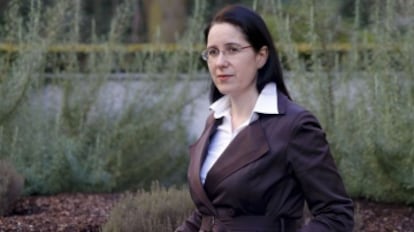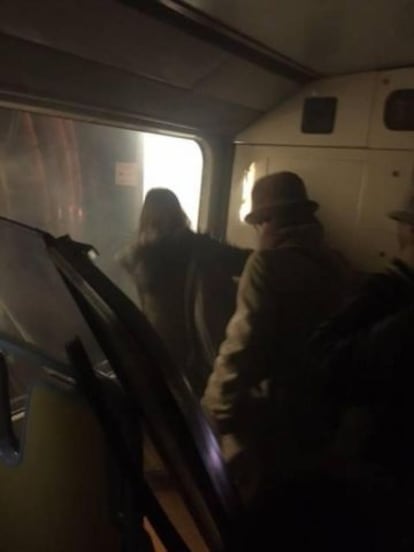Spain’s vice consul in Belgium: “A bomb has gone off. I’m on the train”
Spanish diplomat Rosario Bernal was caught up in last week’s attacks

Early on the morning of Tuesday, March 22, the Spanish consul general in Brussels, who was on vacation in Spain, called his deputy. “Have you seen what happened? There have been explosions at Zaventem airport.” Rosario Bernal, a 47-year-old from Seville with two decades of experience as a diplomat under her belt, read the latest news on the internet and took the metro to get straight to the Spanish consulate, located on Ducale street in the middle of the Belgian capital.
The non-stop calls to her cellphone from the headquarters of the Foreign Ministry in Madrid forced her to get off the train at Schuman station to be able to answer them. She got back on to the first metro train that came past – the very train that was about to be attacked by another suicide bomber.
“We stopped at Maalbeek station, and after we had barely traveled a few meters, we heard an explosion,” she explains. “The carriage was buffeted around, I hit my back against the door and the train stopped. The lights went out, there was a really strong smell of burning and everywhere was full of smoke. Right from the start I knew that it was an attack,” Bernal says.
The lights went out, there was a really strong smell of burning and everywhere was full of smoke. Right from the start I knew that it was an attack Rosario Bernal
A colleague from the consulate heard the sound of the explosion on Rosario’s cellphone while the two were in the middle of talking about how they could organize support for Spaniards affected by the airport attack.
“That was a bomb,” she told her colleague. “I remember that I told her to call the consul general, that she should tell the ministry that there had been a new attack and that I had been inside the train, because at that moment, as well as fearing that there might be another explosion, you also ask yourself, will I be able to get out or not? I didn’t know what was going to happen, and I wanted, at least, for them to know where I was.”
Rosario was in the first carriage of the train. Via a window, which had been blown out by the bomb blast, she was able to jump down on to the platform. “There were screams to start with, and I think that I also screamed from the shock, but the truth is that people stayed calm and began to file out in a disciplined manner. What most shocked me when I stepped on to the platform was the silence, which was only broken by faint moaning.”
Rosario began to climb the stairs toward the street. She didn’t know which way to go. She was moving in the dark, trying to avoid the missing steps on the staircase. On the first floor she tripped over a man whose face was bleeding. “He asked me if he was injured. I told him he was. He asked me for help… We took each others’ arms and we felt our way along, eventually managing to get out.” Once on the street she saw some of the wounded, but the police and the ambulance crews had yet to arrive.

“The first thing that you feel is a sense of guilt: I got out of there as fast as I could and I probably didn’t think about helping those who were still down there and who couldn’t get out,” she explains. “But then straight away I realized that I couldn’t stay there, that I urgently had to get to the consulate.”
Rosario was fine, although she was covered in ash from head to toe. Once at the consulate, she washed her face and began to get her staff together. Someone suggested that she should take a tranquilizer, but she answered saying that it was not the time to be calm, but rather to take action. Work groups were organized, and the ministry was informed of the plans that were underway. Other embassies in Brussels offered their support, and the consulate quickly became a hive of activity. One employee, who was caught up but not injured in the airport attack, returned to the office, her plans to fly to Spain scuppered by the bombs.
Eight phone lines were opened to attend to the families of the victims and friends who were trying to locate their loved ones. Accommodation and alternative routes were also sought for those whose journeys had been cut short by the airport attack. The consulate was open for business until 11pm, while the phone lines were available 24 hours a day. “The first moments were difficult,” explains Rosario. “Cellphones weren’t working, a number of roads were cut off and it was impossible to get around. Everyone was completely overwhelmed. At least we managed to establish channels of communication, and the efforts of all involved were excellent.”
The priority was to locate possible Spanish victims. On Wednesday, the consul general, who had returned to Brussels, visited the nine Spaniards who had been hospitalized. By Saturday there were just three, and fortunately their lives were not in danger. But there were still concerns about whether there were Spaniards among the 31 victims. On Friday their worst fears were confirmed: one of the dead is Jennifer García Scintu, 29, a resident of Düsseldorf (Germany), who had Spanish, Italian and German nationality. She was due to travel to the US with her German husband when she was caught in the attacks. He was seriously injured in the bombing.
English version by Simon Hunter.
Tu suscripción se está usando en otro dispositivo
¿Quieres añadir otro usuario a tu suscripción?
Si continúas leyendo en este dispositivo, no se podrá leer en el otro.
FlechaTu suscripción se está usando en otro dispositivo y solo puedes acceder a EL PAÍS desde un dispositivo a la vez.
Si quieres compartir tu cuenta, cambia tu suscripción a la modalidad Premium, así podrás añadir otro usuario. Cada uno accederá con su propia cuenta de email, lo que os permitirá personalizar vuestra experiencia en EL PAÍS.
¿Tienes una suscripción de empresa? Accede aquí para contratar más cuentas.
En el caso de no saber quién está usando tu cuenta, te recomendamos cambiar tu contraseña aquí.
Si decides continuar compartiendo tu cuenta, este mensaje se mostrará en tu dispositivo y en el de la otra persona que está usando tu cuenta de forma indefinida, afectando a tu experiencia de lectura. Puedes consultar aquí los términos y condiciones de la suscripción digital.









































